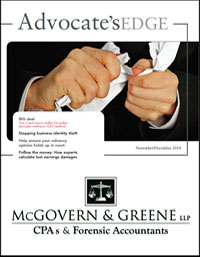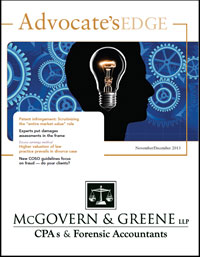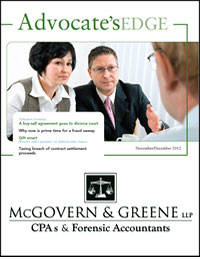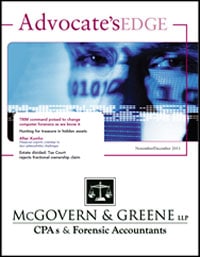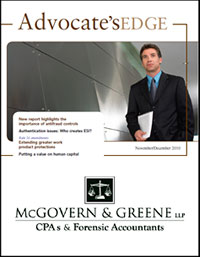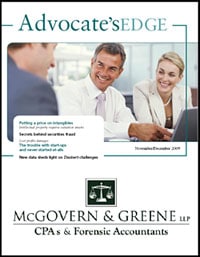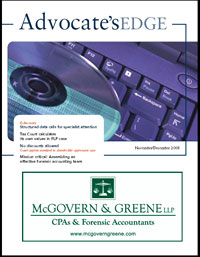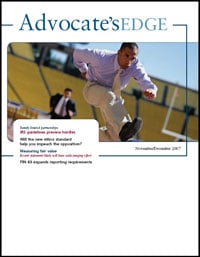Advocate’s Edge
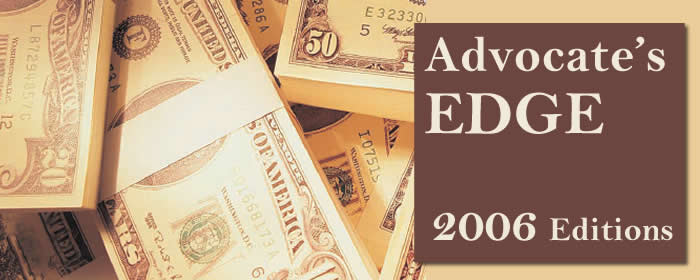
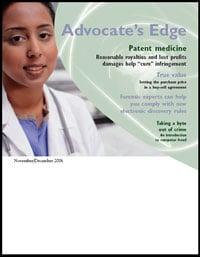 NOV/DEC 2006 ISSUE OF ADVOCATE’S EDGE
NOV/DEC 2006 ISSUE OF ADVOCATE’S EDGE
Patent medicine
Reasonable royalties and lost profits damages help “cure” infringement
Patent infringement litigation is becoming increasingly common. When it comes to damages, reasonable royalties represent the statutory minimum, but plaintiffs often are able to recover greater amounts in the form of lost profits. How these damages are determined depends on a variety of factors.
True value
Setting the purchase price in a buy-sell agreement
A well-crafted buy-sell agreement offers many benefits, including keeping a business in the family and easing the transition from one generation to the next. To achieve these benefits, however, a buy-sell agreement’s valuation provision is critical.
Forensic experts can help you comply with new electronic discovery rules
Amendments to the Federal Rules of Civil Procedure, which take effect soon, are designed to accommodate differences between electronic and conventional discovery. A forensic expert can help you use the new rules effectively and avoid costly mistakes.
Taking a byte out of crime
An introduction to computer fraud
Computer operations are particularly vulnerable to fraudulent manipulation. This article reviews some of the more common types of fraud.
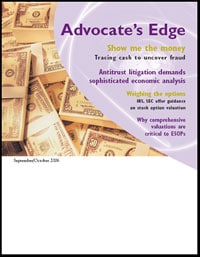 SEP/OCT 2006 Issue of Advocate’s Edge
SEP/OCT 2006 Issue of Advocate’s Edge
Show me the money
Tracing cash to uncover fraud
Forensic experts use a variety of techniques to detect fraud and trace misappropriated cash. This article describes how an expert can help your clients uncover fictitious payable schemes, ghost employee schemes and other common frauds.
Antitrust litigation demands sophisticated economic analysis
Antitrust cases present a number of complex issues involving both liability and damages, and both areas demand comprehensive economic analysis. Proving causation is a particular challenge, requiring more than a positive correlation between the defendant’s alleged misconduct and the plaintiff’s claimed injury. This article gets into the details.
Weighing the options
IRS, SEC offer guidance on stock option valuation
The FASB now requires companies to expense stock options at fair value. Both the SEC and the IRS have weighed in with guidance on valuing options. This article gives an overview of this important valuation topic.
Why comprehensive valuations are critical to ESOPs
Employee stock ownership plans (ESOPs) are required by law to conduct annual stock valuations. Common valuation methods include market multiples, comparable transactions and discounted cash flow. This article warns that the ESOP rules are complex, however, and special valuation considerations may come into play.
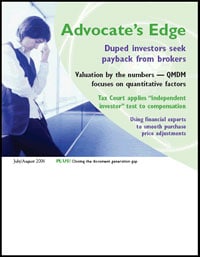 JUL/AUG 2006 Issue of Advocate’s Edge
JUL/AUG 2006 Issue of Advocate’s Edge
Duped investors seek payback from brokers
Investors whose portfolios took dramatic hits as a result of alleged mishandling are looking to recoup their losses from securities brokers. Suitability claims are based on the selection of inappropriate investments, while churning involves excessive trading — with or without the investor’s knowledge. This article looks at this important rising issue.
Valuation by the numbers — QMDM focuses on quantitative factors
In a departure from qualitative benchmark analysis, the quantitative marketability discount model (QMDM) calculates marketability discounts based on expected future dividends, holding period and return requirements. Some courts have accepted QMDM, but it’s not without its critics. This article examines the viability of the model.
Tax Court applies “independent investor” test to compensation
In a recent case, the Tax Court discarded the “multifactor” text in favor of an “independent investor” test in determining whether a taxpayer’s compensation was reasonable. This article discusses the potential ramifications of the court’s findings. Miller & Sons Drywall, Inc. v. Comm’r, T.C. Memo 2005-114.
Using financial experts to smooth purchase price adjustments
Most acquisitions are finalized before closing-date financial statements have been prepared. When the closing-date financials become available, a purchase price adjustment may be required. This article explains why financial experts are invaluable in drafting PPA provisions and helping resolve disputes.
Closing the document generation gap
Inadequate document management can make it difficult to identify and retrieve relevant electronic evidence. This article points out how a forensic expert can help anticipate discovery problems, smooth the evidence-gathering process and identify hidden sources of electronic evidence.
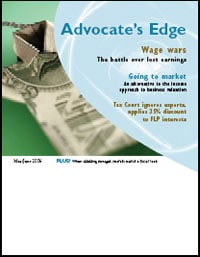 MAY/JUN 2006 Issue of Advocate’s Edge
MAY/JUN 2006 Issue of Advocate’s Edge
Wage wars
The battle over lost earnings
No matter which side of a suit a party is on, understanding the underpinnings of lost earnings damages helps one prepare for the common issues raised. This article discusses challenges such as establishing base earnings, adjusting for seasonal variations and one-time payments and valuing fringe benefits.
Going to market
An alternative to the income approach to business valuation
In some cases, the market approach may be more accurate because it depends on actual prices agreed to by real buyers and sellers. But this article points out that a market-approach valuation is only as good as its underlying data, and, in the age of the Internet, the number of data sources continues to grow.
Tax Court ignores experts, applies 35% discount to FLP interests
In Estate of Kelley, the Tax Court applied a combined 35% discount for lack of marketability to a family limited partnership (FLP) holding only cash and certificates of deposit. This article explains how Kelley demonstrates the importance of selecting the right financial expert when defending an FLP.
Estate of Kelley v. Commissioner, T.C. Memo 2005-235 (October 11, 2005)
When assessing damages, interest merits a closer look
Interest on damage awards is often an afterthought, but interest can give a sizable boost to a judgment’s bottom line. This brief article emphasizes that, to develop strategies for maximizing interest, it’s important to address the issue early in a case.
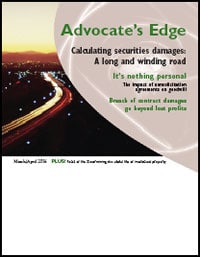 MAR/APR 2006 Issue of Advocate’s Edge
MAR/APR 2006 Issue of Advocate’s Edge
Calculating securities damages: A long and winding road
Determining damages in securities cases is a complicated, multistep process. This article explains how experts look for statistically significant price changes that can’t be explained by ordinary market activity.
It’s nothing personal
The impact of nonsolicitation agreements on goodwill
A Florida appellate court found no distinction between nonsolicitation and noncompete agreements for purposes of distinguishing enterprise from personal goodwill. If business value exceeds asset value only with a noncompete agreement, the court held, then the excess value is attributable to personal goodwill. This article tells the whole story.
Breach of contract damages go beyond lost profits
Lost profits may come to mind first when contemplating damages for breach of contract. This article reveals, however, that several other available remedies should also be kept in mind, including other compensatory damages, incidental and consequential damages, attorneys’ fees and costs, rescission, and reformation.
Facts of life: Determining the useful life of intellectual property
Placing a value on intellectual property—such as patents, copyrights and trademarks — requires a determination of the asset’s remaining useful life (RUL). In addition to statutory limits, a number of factors affect an asset’s RUL, including economic, contractual, legal and technological factors. This article describes some of these factors.
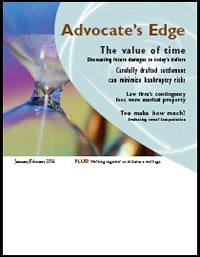 JAN/FEB 2006 Issue of advocate’s edge
JAN/FEB 2006 Issue of advocate’s edge
The value of time
Discounting future damages to today’s dollars
Selecting an appropriate discount rate involves an element of subjective judgment, which can lead to dramatically different damage calculations. This article explains how an understanding of the basics of discounting helps build a strong case in support of damages positions.
Carefully drafted settlement can minimize bankruptcy risks
The peace of mind that comes with settlement can quickly be extinguished if the defendant files for bankruptcy. This article discusses how attorneys should take bankruptcy laws into account when drafting settlement agreements.
Law firm’s contingency fees were marital property
A court found that unpaid contingency fees earned by a husband’s personal injury law practice were marital property, but it rejected the historical average income approach used to value the fees. This article looks at the important lessons of the case.
You make how much?
Evaluating owner compensation
When a business is valued, owner compensation is likely to come under the microscope. Generally, valuators consider only “reasonable compensation” — that is, the amount the business would need to pay a nonowner to provide comparable services. This article goes into the details of this important process.
Working together to dissolve a marriage
The collaborative process lets spouses stay in control and resolve their disputes without going to court. Instead of fueling contention, it encourages everyone involved to work together, share information and solve problems. This short article explicates why parties should communicate in a safe environment, assisted by counsel and financial experts in weighing all settlement options.
This publication is distributed with the understanding that the author, publisher and distributor are not rendering legal, accounting or other professional advice or opinions on specific facts or matters, and, accordingly, assume no liability whatsoever in connection with its use.
GFAS Advocate's Edge Archives
Expert Forensic Accounting Services
Chicago | Las Vegas
FORENSIC ACCOUNTING
SERVICES
Insurance Claims
Accounting Investigations
Mergers & Acquisitions
Due Diligence Reviews
Dispute Advisory Services
Special Examinations
Contract Audits and Recoveries
LITIGATION SERVICES
Expert Witness Testimony
Commercial Damages
Shareholder/Partner Disputes
Bankruptcy and Insolvency
CPA Malpractice Claims
Contract Disputes
Estate and Trust Disputes
Data Mining & Electronic Discovery
FRAUD EXAMINATIONS

